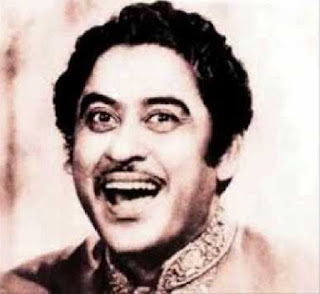Every distinguished creative artiste is born with one gift, but, Hemantda was born with several gifts. As a singer he reigned supreme in Calcutta and Bombay.From Naagin and Jaal to Bees Saal Baad and Kohraa the 50's and 60's were decades that 'belonged' prominently to the unique talents of Hemant Kumar. Remembering him on his 97 th Birth Anniversary,I present some of his Immortal songs.
Hemant Kumar Mukherjee was born on 16 June 1920 in Varanasi. Music seemed to be an inherent part of his life from the outsetAfter passing the intermediate examinations (12th grade), Hemanta joined Bengal Technical Institute at Jadavpur to pursue Engineering. However, he quit academics to pursue a career in music. At the age of 15 Hemanta recorded his first song for All India Radio in 1935.In his early life Hemanta Da used to follow the famous Bengali singer Pankaj Mullick ,he even was called as Chhota Pankaj during those days.In 1937, Hemanta cut his first gramophone disc under the Columbia label. The songs (non-film) on this disc were "Janite Jadi Go Tumi" and "Balo Go Balo More" whose lyrics were by Naresh Bhattacharya and music was composed by Sailesh Duttagupta.
Hemanta's first film song was in the Bengali film Nimai Sanyas released in 1941.His first Hindi film songs were in Irada in 1944 under Pt. Amarnath's music direction.His first movie as a music director was the Bengali film Abhiyatri in 1947.
Hemanta Kumar migrated to Mumbai in 1951 and joined Filmistan Studios,Hemen Gupta. the Director from Bengal with whom he gave music earlier in Bengali films approached Hemanta Kumar to compose music for his first directorial venture in Hindi titled Anandmath under the Filmistan banner.
The music of Anand Math (1952) was a moderate success. Perhaps, the most notable songs from this movie is 'Vande mataram' sung by Lata Mangeshkar,After that Hemanta Kumar scored music for a few Filmistan movies like Shart in subsequent years, the songs of which received moderate popularity. Simultaneously, Hemanta gained popularity in Mumbai as a playback singer.
His songs playbacked for actor Dev Anand under music director Sachin Dev Burman in movies like Jaal (" Yeh raat, yeh chandni phir kahan ... "), House No. 44 (" Chup hai dharti, chup hai chand sitare... "), Solva Saal (" Hai apna dil to awara ..... "), Funtoosh (" Teri duniya mein jeene se ... "), and Baat ek raat ki (" Na tum hame jaano ..... "), became very popular and continues to be so.
By the mid-1950s, Hemanta had consolidated his position as a prominent singer and composer.He composed music for a Hindi film called Nagin (1954) which became a major success owing largely to its music. Songs of Nagin remained chart-toppers continuously for two years and culminated in Hemant receiving the prestigious Filmfare Best Music Director Award in 1955.
In the late 1950s, Hemanta ventured into movie production under his own banner: Hemanta-Bela productions. The first movie under this banner was a Bengali film directed by Mrinal Sen, titled Neel Akasher Neechey (1959).Latter he made films in hindi,his production company was renamed Geetanjali productions and it produced several Hindi movies such as Bees Saal Baad, Kohraa, Biwi Aur Makaan, Faraar, Rahgir and Khamoshi — all of which had music by Hemanta. Only Bees Saal Baad and Khamoshi were major commercial successes.
The 1962 was special year for him,The music of Bees Saal Baad and Saheb Biwi aur Ghulam became very popular.Hemantda pulled out all stops for a score that ranks as one of the ten best ever composed for the Hindi cinema. Between them Geeta Dutt and Asha Bhosle created a universe of pain and romance in Sahib Biwi Aur Ghulam. From Geeta Dutt's 'Na Jao Saiyyan..' to Asha'a 'Bhanwara Bada Naadan Hai..', each song stuns each note cuts deeply in Sahib Biwi Aur Ghulam.
Hemant Kumar sang finest Hindi songs for Sachin Dev and probably his Sazaa and Jaal songs were his first real popular numbers He once became voice of Dev Anand in the mid 50s,he sang 11 songs for him surprisingly all were great hits.
Hemant Kumar was also remained connected with Bangla Films through out his career,in fact he was very busy there in the late 60s and 70s. He remained the foremost exponent of Rabindra Sangeet, film and non-film songs. His output continued to be popular for most of the decade. Some of them are Jodi jante chao tumi... (1972), Ek gochha rajanigandha , Aamay prasno kore nil dhrubatara..., Sedin tomay dekhechilam... (1974), Khirki theke singho duar... (Stree, 1971), Ke jane ko ghonta... ( Sonar Khancha, 1974), Jeona daraon bandhu... ( Phuleswari, 1975 ) and popularised Rabindra sangeet using them beautifully in films as per situations. A very popular and classic example is the song Chorono dhorite diyogo amare.. in Dadar Kirti(1980).
In 1980, Hemanta had a heart attack that severely affected his vocal capabilities, especially his breath control. After that he composed music for a handful of Bengali movies and one Bengali and one Hindi tele-series.In 1987, he was nominated for Padmabhushan which he refused politely.
In September 1989 he travelled to Dhaka, Bangladesh to receive the Michael Madhusudan Award, as well as to perform a concert. Immediately after returning from this trip he suffered another heart attack on 26 September and died at 11:15 pm in a nursing home in South Calcuuta
Song from Sazaa (1951)
Song from Jaal 1952
Song from Patita (1953)
Song from Anarkali (1953)
Song from Shart (1954)
Song from Nagin (1954)
Song from Jhanak Jhanak Payal Baje (1955)
Song from House No. 44 (1955)
Song from Anupama 1966
Song from Pyaasa (1957)
Song from Solva Saal (1958)
Song from Post Box No. 999 (1958)
Song from Detective (1958)
Song from Satta Bazaar (1959)
Song from Kabuliwala (1961)
Song from Baat Ek Raat Ki 1962
Song from Bees Saal Baad 1963
Song from Bahu Rani (1963)
Song from Bin Badal Barsaat(1963)
Song from Kohraa (1964)
Song from Khamoshi 1969




